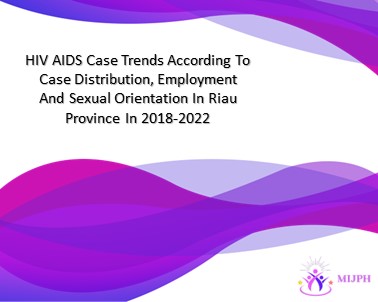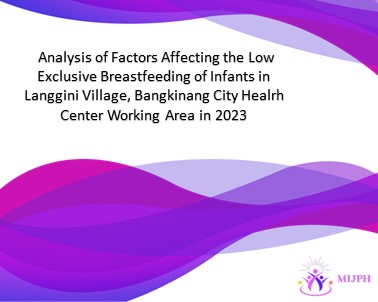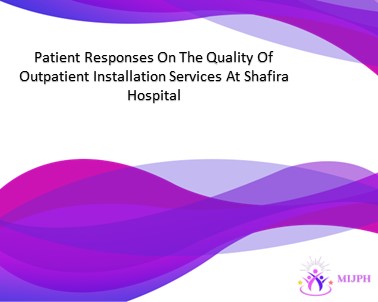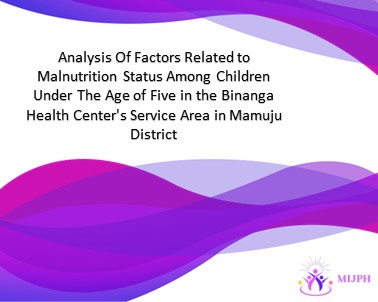The Determinants of Community Activeness Behavior in Participating the Integrated Non-Communicable Disease Service Post (Posbindu PTM) at Pantai Raja Health Center
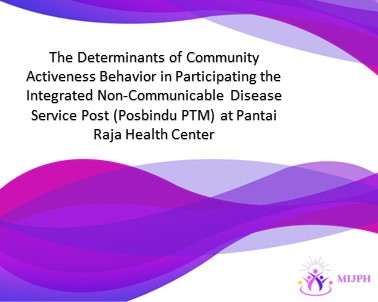
Downloads
The increase of mortality due to non-communicable diseases poses a serious threat to public health. Around 41 millions people passed away because of non-communicable deseases such as heart attack, cancer, Chronic respiratory diseases and diabetes. The aim of this study is to determine the determinants of community activeness behavior in participating in Integrated Non-Communicable Disease Service Posts (Posbindu PTM). This quantitative analytical research utilized a cross-sectional design, conducted from January to March 2023 with 194 respondents, carried out in the Pantai Raja District of Kampar Regency. The analysis employed univariate, bivariate, and multivariate analyses. The research findings indicate that the proportion of community activeness in participating in Posbindu PTM is 91 individuals (46.9%), with correlated variables being age with a 4 times likelihood, education with a 3 times likelihood, support from cadres with a 2 times likelihood, attitude with a 2 times likelihood, and occupation with a 2 times likelihood towards activeness in participating in Posbindu PTM. It is hoped that the health center will innovate NCD programs such as developing a NCD screening application accessible via computers or smartphones to facilitate self-screening. Furthermore, organizing communication training for cadres is essential. Cadres are expected to continuously provide education to increase community interest in attending Posbindu PTM.
Downloads
Dwisetyo, B., Mulyono, S., & Khasanah, U. (2020). Pengaruh Peran Kader Dan Dukungan Keluarga Dengan Pemanfaatan Pos Pembinaan Terpadu Penyakit Tidak Menular. Jurnal Ilmiah Kesehatan Pencera.
Kemenkes. (2020b). Program P2PTM dan Indikator. http://p2ptm.kemkes.go.id.
Kemenkes RI. (2012). Petunjuk Teknis Pos Pembinaan Terpadu Penyakit Tidak Menular (Posbindu PTM). Ditjen Pengendalian Penyakit Dan Penyehatan Lingkungan, Kementerian Kesehatan RI, 1–39. http://p2ptm.kemkes.go.id.
Kementerian Kesehatan RI. (2021). Profil Kesehatan Indonesia 2020. https://pusdatin.kemkes.go.id
Lapau, B. (2015). Metodologi Penelitian Kebidanan. Yayasan Pustaka Obor Indonesia. https://www.google.co.id/books
Maharani, Sibagariang, E. E., & Ginting, R. (2018). Faktor yang mempengaruhi Pemanfaatan Pos
Pembinaan Terpadu Penyakit Tidak Menular di Wilayah Kerja Puskesmas Glugur Darat Tahun 2018. Jurnal Kesehatan Masyarakat Dan Lingkungan Hidup ISSN:, 151(2), 10–17.
Maryati, Budiati, E., & Noviansyah. (2020). Faktor yang Berhubungan dengan Kunjungan PosBindu PTM Di Kabupaten Tulang Bawang Barat Tahun 2020. Jurnal Farmasindo Politeknik Indonusa Surakarta.
Notoatmodjo, S. (2012). Kesehatan Masyarakat Ilmu & Seni. Rineka Cipta.
Purdiyani, F. (2016). Pemanfaatan Pos Pembinaan Terpadu Penyakit Tidak Menular (Posbindu PTM) Oleh Wanita Lansia Dalam Rangka Mencegah Penyakit Tidak Menular Di Wilayah Kerja Puskesmas Cilongok 1. Jurnal Kesehatan Masyarakat (e-Journal).
Sudayasa, I. P., Rahman, M. F., Eso, A., Jamaluddin, J., Parawansah, P., Alifariki, L. O., Arimaswati, A., & Kholidha, A. N. (2020). Deteksi Dini Faktor Risiko Penyakit Tidak Menular Pada Masyarakat Desa Andepali Kecamatan Sampara Kabupaten Konawe. Journal of Community Engagement in Health. https://doi.org/10.30994/jceh.v3i1.37
Supriyatna, E., Pertiwiwati, E., & Setiawan, H. (2020). Faktor yang Mempengaruhi Pemanfaatan Posbindu PTM Oleh Masyarakat Di Wilayah Kerja Puskesmas Martapura. Jurnal Publikasi Kesehatan Masyarakat Indonesia. https://doi.org/10.20527/jpkmi.v7i1.8670
Trilianto, A. E., Hariany, J., Passidiq, & Rahman, H. F. (2020). Dukungan Kader dan Keluarga dengan Pemanfaatan Pos Pembinaan Terpadu Penyakit Tidak Menular Di Wilayah Kerja Tlogosari Di Bondowoso. Jurnal Ilmiah Kesehatan Media Husada, 9(2), 88–99. https://doi.org/10.33475/jikmh.v9i2.206
Umayana, Haniek Try & Cahyati, W. H. (2015). Dukungan keluarga dan tokok masyarakat terhadap keaktifan penduduk ke posbindu PTM. Jurnal Kesehatan Masyarakat, 11(1), 96–101. https://journal.unnes.ac.id
Valentina, F., Andayani, L. S., & Lubis, R. (2023). Impact Factors of Use of Integrated Non-communicable Diseases Development Post at Community Health Centers. Randwick International of Social Sciences (RISS) Journal, 4 (1), 23-87. https://www.randwickresearch.com/index.php/rissj
Yandrizal, Y., Machmud, R., Noer, M., Hardisman, H., Afrizal, A., Lipoeto, N. I., Rahajeng, E., & Pramudho, P. . K. (2016). The Empowerment of Integrated Development Post of Non-Communicable Diseases in Efforts to Prevent and Control Non- Communicable Diseases. International Journal of Public Health Science (IJPHS), 5(3), 294. https://doi.org/10.11591/ijphs.v5i3.479


